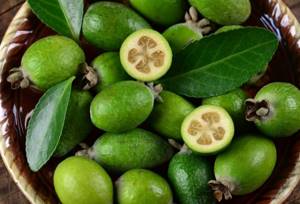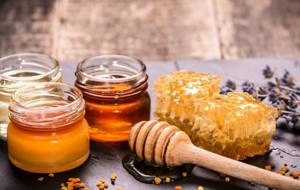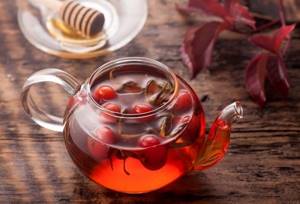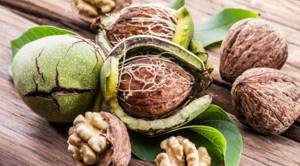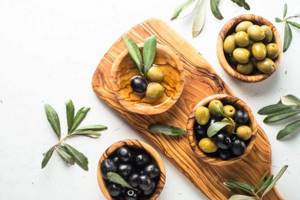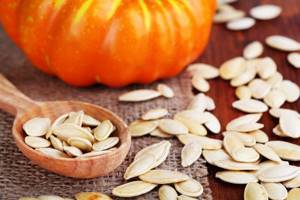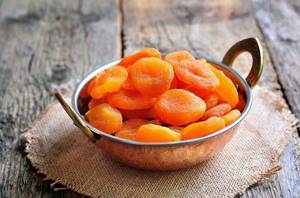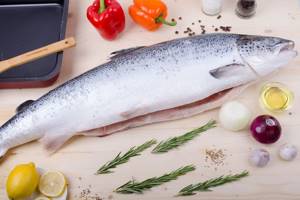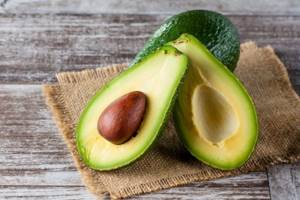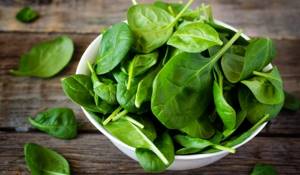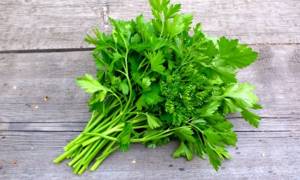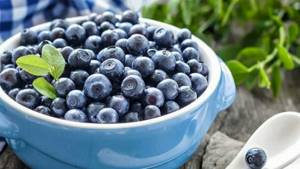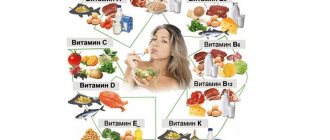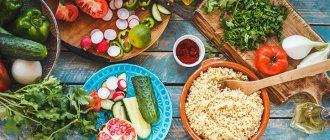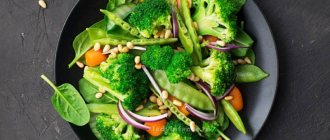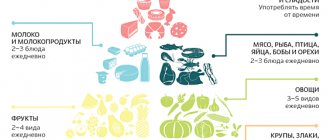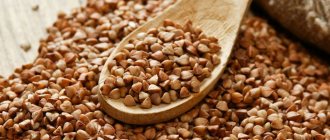Proper nutrition is the basis of beauty and health. If you don’t eat right, even the most expensive and high-quality creams and lotions will not be able to make your skin glowing, young and elastic, and you will have to use medications to maintain the functioning of your organs and systems. Even in ancient times, people understood the value of proper nutrition, so they tried to regularly eat healthy foods rich in vitamins, amino acids, proteins, minerals and essential enzymes. Some serious diseases were even treated with the help of such products, and they were also used to prepare homemade masks, baths and cosmetic mixtures. Today we will tell you how you can maintain health, youth and beauty with the help of simple products, and our TOP of the healthiest food products will help you enrich your diet with essential nutrients.
The healthiest foods to eat
A pineapple
Pineapple contains a substance called bromelain. This is a natural fat burner that will help you stay in shape. But don't be fooled - don't buy canned pineapples. They contain a large amount of sugar, even if you drain all the syrup. Bromelain also helps to recover from inflammatory diseases such as:
- sinusitis
- pyelonephritis
- arthritis
- pneumonia
- sore throat, etc.
Pineapple contains a large amount of citric acid, fiber, ascorbic acid and provitamin A. This fruit makes the blood less viscous, which will save you from thrombosis. It is also useful for hypertensive patients. Pineapple also helps with swelling, which will also have a positive effect on weight indicators. It is believed that eating a small amount of pineapple daily will relieve joint and muscle pain. It is also believed that pineapple helps wounds heal faster.
A little more about the laws of healthy eating
A healthy diet needs to be carefully reviewed. You need to remove junk food from it and reduce the amount of portions you consume. The drinking regime must be observed - liquids allowed for consumption eliminate the feeling of hunger.
Healthy drinks
With a balanced diet, it is recommended to prepare drinks yourself from fresh vegetables, fruits and dried fruits. Compotes must be cooked without adding sugar. Freshly squeezed juices should be consumed immediately and should not be stored in the refrigerator for more than 12 hours.
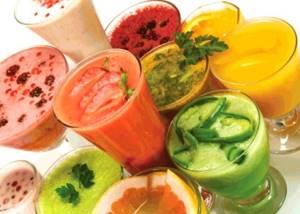
Healthy Breakfast Recipes
For breakfast, it is preferable to prepare porridge from cereals and cereals. Required ingredients:
- skim milk – 250 ml;
- semolina – 3-4 tbsp.
Place the milk on the fire and bring to a boil. After the foam has subsided, add semolina - this must be done carefully, trying to sprinkle the cereal evenly, then there will be no lumps in the porridge. Cook the semolina for 3-4 minutes.
First course recipes
First courses are the basis of lunch. They can be prepared from vegetables and cereals. Ingredients for borscht:
- meat (lean beef) – 400 g;
- potatoes – 3-4 pcs.;
- carrots – 1 pc.;
- beets – 1 pc.;
- salt, seasonings - to taste;
- vegetable oil – 3 tbsp. l.;
- tomato paste – 2 tbsp. l.;
- cabbage – 1/2 head.
The meat is pre-boiled, keeping the broth clear. Potatoes are cut into small cubes and added to boiling water. After the vegetable is cooked until half cooked, shredded cabbage is added to the broth. The onion is cut into half rings, the carrots are grated, and the vegetables are fried in a small amount of oil. When the onion turns golden, add tomato paste and grated beets. Simmer for 5-7 minutes. Frying is added to borscht. Salt and pepper to taste. The meat can be cut into portions in advance. Greens are added to the finished dish.
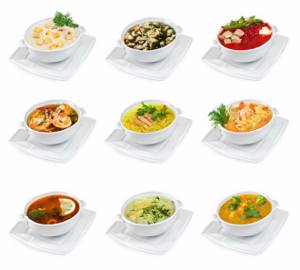
Main course recipes
Main courses can be eaten for lunch and dinner. Fish with rice in foil - ingredients:
- fish fillet – 300 g;
- brown rice – 100 g;
- olive oil – 2 tbsp. l.;
- seasonings, salt - to taste.
All bones are first removed from the fish. The fillet is cut, salted, peppered and watered with 1 tbsp. l. olive oil. After 30-40 minutes, boil the brown rice until tender. The foil is spread on a flat surface, rice and fish are placed on it and sealed tightly. The raw dish is placed in the oven for 30 minutes.
Bananas
Bananas envelop the stomach and intestines, relax the muscles of blood vessels, and also have a calming effect. Therefore, banana is indicated for people who have been diagnosed with an ulcer. Although people seeking to lose weight reject this fruit because of its rather high calorie content (compared to other fruits and berries), it is still very healthy. Bananas contain potassium, which is why athletes eat them after a hard workout in the gym.
Bananas contain a protein called tryptophan, which becomes serotonin during digestion. And serotonin, as we know, is a mood-improving hormone. It is needed by men and women who want to feel happy and satisfied with life. So, if you're in a bad mood, should you reach for a banana rather than chocolate?
By the way, a banana can help you get rid of a bad habit - smoking. It contains magnesium, potassium, vitamins B12 and B6, which help the body not crave nicotine so much. Even diabetics can eat bananas. Of course, you need to know when to stop!
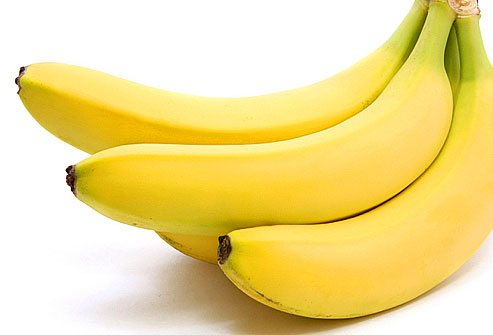
Paleo diet
The Paleo diet is a technique based on the consumption of natural foods. Preference should be given to fruits and berries, fibrous vegetables, nuts, seeds, dairy products, lean fish and meat. Dishes prepared from these products are rich in vitamins and microelements. With the help of a diet, you can get rid of extra pounds and restore poor health.
The nutritional system requires the complete exclusion of white sugar and all products in which it is present from the diet.
Coffee and strong black tea, legumes, cereals and dairy products (except kefir) are prohibited. For breakfast you can eat chicken eggs (omelet, scrambled eggs). Second breakfast - fruits, nuts, seeds. Lunch – salads of fresh vegetables and herbs, dressed with olive oil, lean poultry. Fish is most often prepared for dinner.

Grape
This product cannot be called an absolutely dietary product, because it contains a fairly large amount of sugar. That’s why athletes who are preparing for performances in the bikini or men’s physics categories exclude grapes from their diet. But, if we don’t have to stand on stage in a swimsuit, then we can eat grapes at least every day. It will not harm your figure at all and is a delicious alternative to other desserts.
By the way, grapes have a positive effect on metabolism, cleanse the body of accumulated radionuclides and are useful for heart disease. Grape juice tones our body and also reduces cholesterol in the blood. Flavonoids contained in grapes are antioxidants. This means that grapes are a natural remedy for aging of the body. And these are not all of its beneficial properties!
Pomegranate
Pomegranate is also a storehouse of vitamins and minerals. It also contains fifteen amino acids, including essential amino acids (which are not synthesized in the human body; they can only be obtained from food). Therefore, pomegranate is recommended for people who do not eat meat or eat it in small quantities.
Regular consumption of pomegranate has a positive effect on:
- hematopoietic processes
- nervous system
- immunity (body's defenses)
- gastrointestinal tract, etc.
The pomegranate contains:
- magnesium
- potassium
- iron
- calcium
- iodine
- silicon
- tannins, etc.
If you have dysbiosis, systematic consumption of pomegranate juice will help get rid of the disease. It is better not to add sugar to it so as not to cause fermentation processes in the intestines. Also, daily consumption of juice is a prevention of breast cancer in girls and women. People with heart disease can also benefit from treating themselves to fresh pomegranate juice from time to time.
Food pyramid
Thanks to a balanced diet, you can form new eating habits and normalize the functioning of the digestive tract. The basis of the system is the division of all products into 3 categories:
- liquid;
- bulk;
- solid.
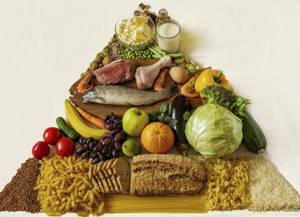
A schematic representation of the basic diet allows you to correctly compile a food basket and avoid purchasing prohibited products. At the base of the pyramid and in its center there is permitted food, at its top there are foods and dishes that must be excluded from the diet. The pyramid includes 4 steps:
- base – fruits and vegetables, unsaturated fats of vegetable origin, grain crops;
- second stage – products containing plant and animal proteins;
- third stage – dairy and fermented milk products;
- top – alcohol, sweets (light carbohydrates), flour products.
The variety of techniques is represented by several colors: green - all vegetables and herbs, orange - bread and cereals, red - fruits, berries, yellow - fats.
Whole grain bread, oatmeal, rice and pasta
You need to stop eating white bread and replace it with whole grain or rye bread.
Oatmeal is most often consumed for breakfast. Rice is added to first and second courses; it is recommended to give preference to steamed varieties of cereal or brown rice. It is better to cook it without salt or with a small addition of it. Pasta can be included in the diet provided that the product is made from durum wheat.

They must be eaten separately from each other - bread is not combined with pasta and rice, noodles are not eaten at the same time as rice. The products are prepared with meat, fish and vegetables. The daily norm of bread is no more than 2-3 slices; it can be consumed three times a day.
Vegetables
Vegetables are the main source of vitamins and minerals. They supply the body with carbohydrates, acids of organic origin and microelements. Vegetables are enriched with fiber, which normalizes digestion and promotes faster elimination of toxins. Vegetables that are beneficial to the body include:
- Carrot. Contains carotene, vitamin PP, K, C, E. Regular consumption helps improve blood composition, normalizes the functioning of the cardiovascular system and gastrointestinal tract.
- Tomatoes. Normalize metabolic processes in the body, the functioning of the kidneys and intestinal tract. Useful for anemia and heart pathologies.
- Onion. The presence of this vegetable in the diet is mandatory. Contains phytoncides that strengthen the immune system.
- Garlic. A natural antibiotic has a strengthening, antiseptic effect on the body.
- Bulgarian pepper. Contains vitamin C, PP, B and A. Accelerates the elimination of toxins.
- Cabbage. Healthy dishes can be prepared from white cabbage, cauliflower and sea cabbage. According to reviews, this vegetable helps in the fight against cancer.
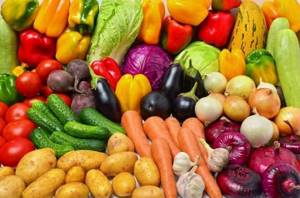
You can include beets in your diet - they are rich in vitamins, microelements and natural sugar.
Fruits
Proper balanced nutrition requires daily consumption of fruits. Pineapples and oranges accelerate the breakdown of fats, apples and pears saturate the body with amino acids. They are eaten during a snack or breakfast - at this time they are absorbed faster. Fruits replenish the body's need for sugar and glucose.
Meat, poultry, fish, dry beans, eggs and nuts
Lean meat (poultry, veal, beef) are suppliers of animal fats and proteins. The fish is enriched with minerals, including phosphorus. Nuts contain unsaturated fatty acids, which strengthen blood vessels. Eggs should be present in the diet; they are most often eaten for breakfast.
Legumes (beans, lentils) can be included in the diet every other day. They are suitable as a side dish and can serve as an independent dish. Beans quickly saturate due to the presence of acids of organic origin; the nutritional value of the crop is 55-60 kcal.
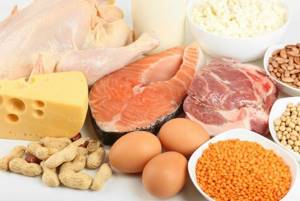
Products in this category reduce cholesterol and blood sugar levels and have an astringent effect on the body. Regular consumption of beans helps prevent the development of pathologies of the cardiovascular system and cancer. The elements present in beans speed up digestive processes.
Milk, kefir, cheese, yogurt
Dairy products contain lactose - milk sugar, which ensures the normal functioning of intestinal lacto- and bifidobacteria. Lactose has a positive effect on the central nervous system. The chemical composition of milk and dairy products ensures the resistance of immunity to pathogens. Despite all the benefits of milk sugar, an excess of this element can lead to the development of problems with bowel movements.
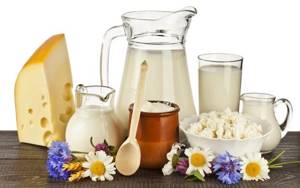
Fats, oils and sweets
Sweets, butter and vegetable fats should be partially excluded from the diet. They have a detrimental effect on the body, accelerating the formation of fatty plaques on the walls of blood vessels. Animal fats and butter accelerate the process of fat deposition in the subcutaneous layer.
Figs
Figs contain the following beneficial substances:
- vitamins B, C, A and PP
- amino acids in large quantities
- calcium
- iron
- phosphorus
- potassium
- bromine
- sulfur
Like bananas, figs contain a lot of potassium, which is why consuming them is beneficial for patients with pathologies of the cardiovascular system. With a persistent increase in blood pressure, this fruit will help normalize your well-being. Of course, one-time use will not reduce blood pressure, but systematic introduction into the diet is very useful.
The amino acids contained in figs break down cholesterol into smaller parts so that it does not accumulate in our body. The fruit also has anti-edematous properties. It laxes the intestines and is a diuretic, which is why it can be seen as part of some diets. When consuming dried or dried figs, remember that they contain a concentrated amount of sugars. Also, fruits that have undergone such processing may contain harmful chemicals (which help figs to be stored better, improve their color, taste, etc.).
Figs are also needed to normalize hematopoietic processes. Therefore, girls and women benefit from this particular fruit during menstrual periods in the amount of 2-3 fruits per day. If you have a calcium deficiency, you should rely not only on pharmaceutical preparations, but also on natural sources, including figs.
In this article you will learn what the most useful products are for human health, and what diseases they help get rid of.
As they say, a healthy mind in a healthy body, which is why it is very important to take care of your health.
Everyone knows that food has a great influence on health, because it can cause serious illnesses, or, conversely, be beneficial.
10 most useful products
1. Walnuts are considered to be the healthiest of all types of nuts, and all because their composition includes a large number of antioxidants. With their regular use, the child’s body begins to develop, and they also prevent diseases such as diabetes and anemia.
Because walnuts contain protein and fiber, they have a great impact on bowel function. Omega 3 acids help prevent many heart diseases, which is why they are considered one of the healthiest foods.
2. Rice has been consumed by residents of Asian countries for a long period of time, so they are able to work all day without experiencing any discomfort in the intestines.
Rather, on the contrary, due to the fact that it contains starch and substances that help the pancreas work, rice is able to protect the walls of the stomach. Gastritis and similar stomach diseases will not occur if you often eat rice.
3. Seafood contains a huge amount of essential substances, including vitamins, which is why they are considered one of the healthiest foods in the whole world. They contain water, proteins, minerals and vitamins.
It is worth noting that phosphorus, potassium, calcium, sodium and iodine are found in large quantities in seafood. It is impossible to gain extra pounds from them, since their glycemic index is zero.
4. Apples are fruits that 100% should have been on this list. This is due to a number of medicinal properties due to the high fiber content, as well as vitamin C. With constant consumption, apples begin to tone the body.
It is thanks to apples that you can avoid some diseases, for example, anemia, stomach disorders, headaches, heart disease, and high blood pressure.
5. Spinach is a vegetable that has gained popularity due to its anti-cancer properties. The presence of beta-carotene ensures the fight against the formation of cancer.
6. Black currant contains all the minerals that the body needs for normal functioning. It can also cleanse the skin of rashes and inflammation.
7. Broccoli contains a substance that helps fight stomach diseases. In addition, there are minerals that produce an enzyme that destroys cancer cells.
8. Salmon and other red fish contain oils that are necessary for the development of human skin. They add shine to hair and contain essential vitamins - riboflavin, pyridoxine, retinol, niacin.
9. Lemon is very useful , as it can disinfect the entire human body at once. In addition, this fruit contains a flavonoid, which fights the occurrence of cancer cells.
10. The healthiest foods contain antibiotics. For example, garlic is a natural antibiotic that can protect against fungi, bacteria and many viruses.
When consumed, you can quickly recover and prevent diseases. Garlic contains antibiotic substances that fight staphylococcus and similar bacteria, which are very dangerous to health.
Which product is the healthiest?
It cannot be said that one of the products is more useful than the other. Ideally, you need to eat a little of everything, then you will take care of all the organs of your body and will be maximally protected from diseases and viruses.
Cranberry
Cranberry is needed by those from whom increased physical and intellectual stress takes away all the body's resources. This product is useful for hypertensive patients and people with low secretion of gastric juice. It is also included in the diet for diseases of the bladder, kidneys, etc. Drinking fresh cranberry juice prevents stone formation and pancreatitis. If you have an intestinal or stomach ulcer, it is better not to eat cranberries.
Cabbage
As you know, cabbage contains a large amount of water, vitamins and other useful substances. It is also low in calories. Therefore, it is useful for those losing weight to make salads based on cabbage. They help you feel full (fill your stomach) without going overboard with calories. You can and should eat cabbage if you have:
- gastritis with low acidity
- gallbladder disease
- liver pathology
- gastric atony
- colitis
But those who have increased stomach acidity or a tendency to accumulate gases in the intestines should consume cabbage with great caution.
Tangerines
Tangerines saturate our body with vitamins and water. They contain large amounts of ascorbic acid. Therefore, your mother was right when she gave you a large amount of tangerines when you had a cold. This fruit helps normalize body temperature. Tangerines contain phytoncides that kill germs. And tangerine peel has a positive effect on digestion and helps with cough.
Action of tangerine:
- anti-mucus
- decongestant
- antidepressant
- tonic
- prevention of cholesterol deposition
- prevention of heart disease
Beet
Many people don’t like beets, and for good reason! If you have been suffering from constipation for a long time, you should finally make yourself a beet salad. You can also eat a little fresh beetroot, but not on an empty stomach. Beets are useful for those who want to cleanse their body of radioactive substances. If you live in the Chernobyl zone, be sure to add this vegetable to your diet.
Beets are also useful for those who watch their figure. It has a beneficial effect on lipid metabolism in the body. Beets are also useful for hypertensive patients. With regular use, it normalizes blood pressure.
Other useful products
The top 100 most useful products should also include:
- pumpkin
- dates
- persimmon
- apples
- broccoli
- lettuce leaves
- almond
- oatmeal
- lemon
- salmon, etc.
The list is so long because a person’s diet should be varied. That is, no matter how useful carrots are, we cannot eat them exclusively every day. Remember that mono-diets have a negative impact on your health, although they can help with short-term weight loss. Take care of yourself - eat right!
TOP of the healthiest foods to eat
| Photo | Name | Rating | Price | |||
| For immunity | ||||||
| #1 |
| Feijoa | ⭐ 100 / 100 1 - voice | Product link | ||
| #2 |
| Honey | ⭐ 99 / 100 | Product link | ||
| #3 |
| Rose hip | ⭐ 98 / 100 1 - voice | Product link | ||
| For the brain | ||||||
| #1 |
| Walnut | ⭐ 100 / 100 | Product link | ||
| #2 |
| Olives | ⭐ 99 / 100 | Product link | ||
| #3 |
| Pumpkin seeds | ⭐ 99 / 100 | Product link | ||
| For the heart and blood vessels | ||||||
| #1 |
| Dried apricots | ⭐ 99 / 100 | Product link | ||
| #2 |
| Salmon | ⭐ 98 / 100 | Product link | ||
| #3 |
| Avocado | ⭐ 97 / 100 | Product link | ||
| For vision | ||||||
| #1 |
| Spinach | ⭐ 98 / 100 | Product link | ||
| #2 |
| Parsley | ⭐ 97 / 100 | Product link | ||
| #3 |
| Blueberry | ⭐ 96 / 100 | Product link | ||
Which product do you think is the most useful?
Take the survey
For vision
Vision is the most important ability of the human body, allowing not only to obtain a complete picture of the world around us, but also influencing speech, mental and emotional development of a person. With age, most people's vision decreases, which is facilitated not only by physiological age-related changes in the lens and cornea, but also by a deficiency of elements necessary for high-quality nutrition of eye tissue. To ensure the prevention of visual pathology and maintain visual acuity for a long time, foods rich in lutein, zeaxanthin and vitamin A should be regularly included in the diet.
Blueberry
Blueberries are one of the most useful berries for people with vision problems, a congenital or professional tendency to visual pathology. Blueberry berries and leaves are used for medicinal purposes for various degenerative-dystrophic changes in the lens, cornea and vitreous body, as well as for mild or moderate retinal detachment. It is known that during the Second World War, British pilots ate 40-50 g of natural blueberry jam daily to maintain twilight vision during night flights.
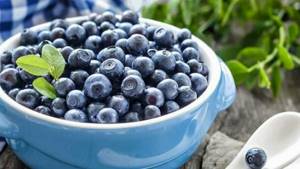
Blueberries are the healthiest berry for eyesight.
In clinical ophthalmology, in most cases, blueberry extract is used, rich in lutein, anthocyanin (a natural dye) and vitamin A in a bioavailable form, but often the composition of medicinal preparations and preparations includes leaves, shoots and blueberry cake, in which the concentration of useful substances is not inferior to the fruit pulp . Despite the fact that herbalists talk about the limited therapeutic effect of this berry, it has been proven that regular consumption of blueberries reduces the risk of developing ophthalmic diseases by 20-30% by improving blood flow in the retina and lens tissue.
pros
- improves the circulation of blood and other biological fluids in the retina of the eye and lens tissues, ensuring the prevention of stagnant and degenerative changes;
- increases night vision acuity;
- Blueberry decoction is an effective remedy against diarrhea;
- the glycoside contained in the berries and leaves lowers the concentration of glucose in the blood, so blueberries are very useful for diabetes;
- supports normal functioning of the heart muscle.
Minuses
- in large quantities, blueberries are contraindicated in cases of irritable bowel syndrome, acute gastritis, chronic duodenitis and other gastrointestinal pathologies in which digestive dysfunction occurs as constipation.
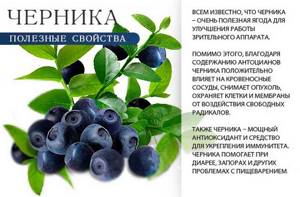
To maintain eye health and prevent ophthalmic diseases, it is recommended to eat a handful of fresh blueberries daily (but no more than 3-4 weeks of regular consumption). A decoction of leaves and shoots is also useful for this purpose; to prepare 100 g of raw material, pour 500 ml of boiling water and cook over low heat for about 12-15 minutes. Drink 1 glass daily in the morning for 1-2 months.
blueberry
Video - All about the benefits of blueberries
Parsley
Parsley has been used since ancient times as a decongestant, anti-inflammatory and wound healing agent. In Ancient Rus', parsley decoction strengthened gums, treated diseases of the kidneys, liver and digestive organs, and also combated excessive sweating. The positive properties of this plant for the visual organs were discovered relatively recently during scientific and laboratory studies. They showed that the juice contained in parsley leaves strengthens the capillaries of the fundus and retina of the eye, improves microcirculation and has a complex effect on visual acuity, preventing ophthalmospasm and other visual pathologies that can develop against the background of circulatory disorders in the blood vessels of the eyes.
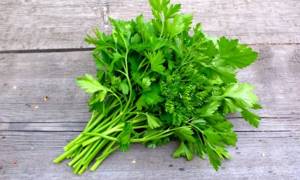
Parsley juice strengthens the capillaries of the fundus and retina of the eye
pros
- strengthens the walls of capillaries and improves microcirculation of blood and tear fluid in the tissues of the eye, allowing you to maintain visual acuity;
- increases appetite;
- improves gastrointestinal motility;
- stimulates the secretion of bile;
- parsley decoction heals wounds and relieves inflammation (when applied topically);
- Parsley juice is used to treat cystitis, urolithiasis and kidney spasms.
Minuses
- the consumption of fresh parsley should be limited if you suffer from any inflammatory kidney diseases, regardless of their pathomorphological and clinical specificity.

To prevent visual disorders, it is recommended to consume fresh parsley at least 2-3 times a week.
parsley
Spinach
Spinach is the real “king of vegetables”, one of the healthiest foods for people of any age. 100 g of freshly cut spinach contains about 12,000 mcg of lutein, an oxygen-containing carotenoid that plays an important role in the physiology of vision. Regular consumption of spinach helps improve visual acuity (including night vision), increase its clarity and reduce the flow of the most aggressive part of the visible optical spectrum. Lutein, contained in spinach, prevents lens opacity and dystrophy, protects the retina from damage and degenerative changes, and also prevents the formation and accumulation of lipofuscin, a pigment that is the most important factor in retinal aging and the development of cataracts.
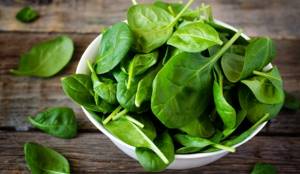
Spinach contains large amounts of lutein, which plays an important role in the physiology of vision.
Lack of lutein in the human body is the main cause of the development of macular degeneration, which, if progressed, leads to complete loss of vision and blindness. The most effective way to increase the concentration of this pigment in the blood serum is to daily eat foods rich in lutein, in particular spinach. In many cases, this leads to an increase in the density of the macular spot and a reduction in the risk of macular degeneration by almost 2 times, so spinach is especially useful for older and elderly people.
pros
- provides prevention of macular degeneration and destroys the lipofuscin pigment, which in large quantities leads to partial or complete loss of visual function;
- increases clarity and acuity of vision (including night vision);
- contains a lot of bioavailable iron, necessary for the prevention of anemia;
- spinach is one of the main sources of folic acid, which ensures proper development of the fetus during pregnancy;
- Due to the high amount of antioxidants, regular consumption of spinach leaves helps maintain youthful and beautiful skin.
Minuses
- the vegetable contains a lot of oxalates, so it should not be consumed if you have kidney stones and urolithiasis, as well as a high risk of developing these diseases (heat treatment destroys only 10-15% of these substances);
- Spinach is traditionally on the list of vegetables "overloaded" with pesticides, so it must be thoroughly washed with hot water before consumption.
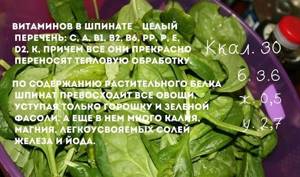
You can eat spinach in almost any form, but more often it is used raw and added to salads. The product retains its beneficial properties for 8 days at a temperature not exceeding +5°C and for no more than 7-8 months when stored in the freezer.
spinach
For the heart and blood vessels
The heart, without exaggeration, is the most important organ in the human body. The work of all organs and systems depends on its condition, since it is the heart that is the “motor” that accelerates blood enriched with iron, vitamins, oxygen and other necessary substances through the blood vessels, from where it enters all the cells and tissues of the body. For the heart to function properly, it needs not only regular physical activity, but also additional support in the form of mineral salts (primarily potassium and magnesium, which maintain osmotic concentration and acid-base balance of the blood), which are found in some foods.
Avocado
Avocado pulp is one of the leaders among food products in terms of the content of monounsaturated fatty acids, which are necessary for the health of the cardiovascular system. Randomized controlled trials conducted in Sweden and the UK provided clinical evidence that regularly consuming avocados reduced cholesterol levels by almost 9.2%. Avocado oil nourishes and strengthens the heart muscle, increases its resistance to stress and the effects of immunosuppressive stress factors. In combination with other components (for example, soy), avocado fruits are included in non-steroidal anti-inflammatory drugs and delayed-action symptomatic drugs with a lasting clinical effect.
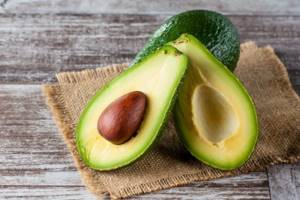
Avocado oil helps nourish and strengthen the heart muscle
pros
- strengthens the heart and saturates it with essential monounsaturated fatty acids;
- reduces cholesterol levels (prevention of atherosclerosis);
- protects the mucous membrane of the liver and stomach;
- improves the lipid profile in patients with type 2 diabetes and helps maintain normal blood sugar levels;
- slows down the processes of cellular aging.
Minuses
- Since avocado effectively reduces serum glucose levels, it is not recommended to be consumed frequently by patients with hypoglycemia (there is a risk of developing a hypoglycemic crisis).
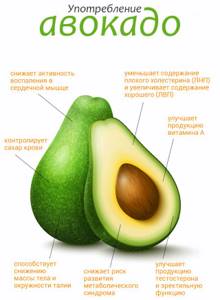
It is necessary to consume avocado several times a week to support the heart and blood vessels. It can be added to salads, cold appetizers, or made into sweet creams and milkshakes (only mature pulp is used).
avocado
Video - The effect of avocado on the body
Salmon
Salmon (lake salmon) is one of the most valuable commercial species among salmon. Not only meat, but also lake salmon caviar has high taste and nutritional qualities, while being quite expensive delicacies. Like avocado, salmon contains a large amount of monounsaturated fatty acids, which strengthen the heart, help maintain normal heart rhythm and prevent dystrophic changes in the myocardium. Regular consumption of salmon (at least 2 times a week) reduces the risk of heart attacks and strokes by 13.2%, improves brain function, saturates the body with essential micro- and macroelements, and also improves the condition of the skin and hair due to the large amount of vitamin E and the complex antioxidants.
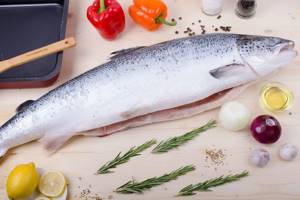
Eating salmon helps maintain a normal heart rhythm and prevents dystrophic changes in the myocardium
pros
- strengthens the heart and prevents the development of dystrophic changes in the myocardium;
- is a source of valuable protein necessary for the normal functioning of muscle and connective tissue (including heart tissue);
- contains acids that improve brain function;
- increases immunity;
- maintains the beauty of skin and hair, prevents the aging process of the dermis at the cellular level.
Minuses
- Contraindications for eating lake salmon are allergies to this type of fish and severe forms of obesity (salmon contains a lot of fat and in large quantities significantly increases the total calorie content of the daily diet).
Doctors advise eating salmon 1-2 times a week. It is better to cook it without adding oil, since this fish itself is quite oily.
You can replace lake salmon with tuna, trout and other types of red fish - almost all of them contain acids necessary for the heart and brain, but salmon is the absolute favorite.
salmon
Dried apricots
Dried apricots are one of the varieties of dried apricot (you can also find apricot, kaisa, ashtak and other types on sale) and a very valuable source of potassium - an element without which normal heart function is impossible. Potassium is necessary to normalize electrolyte and acid-base balance, create membrane potential and conditions for muscle contractions of the myocardium, as well as maintain the osmotic concentration of the blood. Long-term or acute potassium deficiency can lead not only to myocardial dystrophy and heart rhythm disorders, but also to pathologies of skeletal muscles, as well as acute neuralgic manifestations.
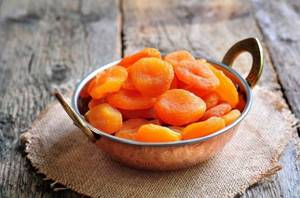
Dried apricots are the main source of potassium
In addition to potassium, dried apricots are also rich in organic acids, phosphorus, calcium, vitamins (primarily B vitamins), and carotene. Compotes and desserts made from dried apricots are recommended for children to increase immune resistance and prevent anemia (the fruits contain a lot of iron).
pros
- maintains acid-base and electrolyte balance of the blood;
- strengthens the heart, normalizes muscle contractions and heart rate;
- prevents the development of anemia;
- increases the body's protective functions;
- improves complexion due to the high content of vitamins and minerals;
- strengthens skeletal muscles;
- reduces the risk of developing neuralgic pathologies.
Minuses
- Dried apricots in large quantities are contraindicated for peptic ulcer of the small intestine.
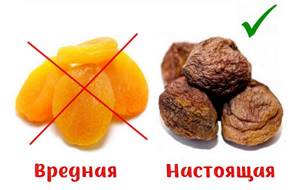
Please note that about 80% of dried apricots presented on the Russian market are made with the addition of a preservative - sulfur dioxide. Regularly entering the body, it accumulates in tissues and can provoke an allergic reaction, bronchial asthma, and bronchopulmonary tract diseases. The number of people with these disorders, caused precisely by the accumulation of sulfur dioxide in the body, does not exceed 1-2%, but it is better to choose a product without preservatives, even if its cost is 1.5-2 times more expensive.
dried apricots
For the brain
The brain is the most important organ of the human body, which regulates the functioning of the entire body. In order to preserve memory, the ability to think intelligently, and attention for a long time, it is necessary to support the brain with useful elements and nutrients.
Pumpkin seeds
Pumpkin seeds are not only very tasty, but also a very healthy snack for both adults and children. They contain a large amount of carotene and carotenoids, essential oils, resinous substances, amino acids and phytosterols, but fatty oils are of greatest value for brain cells (fatty oils account for about 40%). Just 100 g of pumpkin seeds satisfy the daily protein requirement by 16-18%, in addition, they are a valuable source of copper, potassium, magnesium, iron, phosphorus and other essential elements. Pumpkin seeds in any form contain a lot of vitamin K and zinc, so they are good not only for the brain and heart, but also for the human immune system.
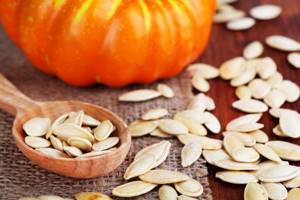
Pumpkin seeds contain copper, potassium, magnesium, iron, phosphorus and other elements
In alternative medicine, pumpkin seeds are used to treat parasitic infections (including various helminthiases), prostatitis and liver diseases.
pros
- improve brain and heart function;
- strengthen the body's protective functions;
- help fight chronic fatigue, increase performance;
- in their raw form, pumpkin seeds are useful for various depressive disorders;
- satisfy the needs of an adult for essential vitamins and minerals by 10-20%;
- kill worms (including tapeworm);
- stimulate sexual activity in men.
Minuses
- There are no obvious contraindications for consuming pumpkin seeds, but it is better to avoid them in their raw form during periods of exacerbation of any diseases of the digestive and hepatobiliary system.
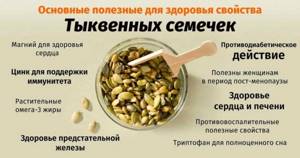
It is better to eat pumpkin seeds raw, but you can fry them a little in a frying pan without oil, adding salt, sugar or cinnamon. Pre-soaked and crushed (in a blender) with the addition of water, the seeds taste like sesame or almond milk.
pumpkin seeds
Olives
Olives are considered a product for everyone, and many people refuse to eat them, but in vain. Raw olive pulp (regardless of variety) contains up to 80% non-drying oil, 75% of which is unsaturated fatty acids necessary for healthy heart and brain function. These acids are the building material for all cells of the human body, including brain cells. The body synthesizes them only partially, therefore, to maintain all vital functions, it is necessary to supply these acids with food.
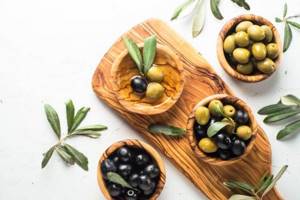
Olives contain unsaturated fatty acids essential for healthy heart and brain function.
Olives also have the property of lowering blood pressure, so they are useful for hypertensive patients and people with chronic heart and vascular diseases of the hypertensive type.
pros
- participate in the cellular regeneration of all vital organs, including the heart and brain;
- prevent oxidation and premature aging of brain cells;
- reduce cholesterol levels;
- improve skin condition;
- reduce blood pressure;
- Olive oil can be used as a local wound-healing, anti-inflammatory and caring agent.
Minuses
- In large quantities, olives can cause stool upset, so you should not include them in your diet during diarrhea or constipation.
To improve memory, attention, and prevent heart pathologies, it is enough to consume several ripe olives a day. One spoon of extra virgin olive oil per day, according to some experts, reduces the risk of cancer of the respiratory tract and blood by 16.8%.
olives
Walnut
It’s not for nothing that walnuts look like halves of a brain. Their rich chemical composition (amino acids, flavonoids, ascorbic acid, carotenoids, vitamins, etc.) makes them one of the healthiest nuts and food products in general for people of any age. In childhood, walnuts help improve memory, concentration, school performance, and the body's ability to withstand and adapt to various mental, emotional and physical stress. A few nuts a day have a positive effect on the formation of immunity and help maintain the normal functioning of the body’s most important systems.
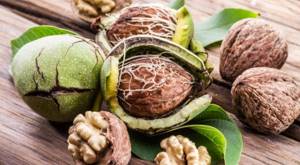
Walnut is one of the healthiest nuts
It is also useful for older people to include walnuts in their diet, as they prevent cellular aging of the brain and are one of the means of comprehensive prevention of Alzheimer's disease, dementia and other diseases accompanied by irreversible changes in the functioning of the brain.
pros
- improve brain function, help improve school performance and reduce the negative impact of emotional and intellectual stress;
- in combination with other measures, they reduce the risk of developing pathologies accompanied by irreversible disorders of brain activity;
- strengthen the immune system;
- contain up to 76% of fatty acids necessary for heart function;
- saturate the body with essential vitamins, macro- and microelements.
Minuses
- with moderate use there are no contraindications.
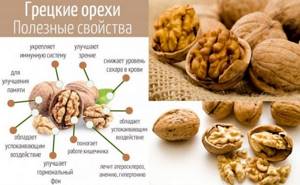
It is best to eat walnuts raw, 8-10 pieces per day. In moderate quantities, green walnut jam is also useful: 1 teaspoon of this jam provides the body with the necessary beneficial substances and nutrients for 20-30% of the daily requirement.
Walnut
For immunity
Human immunity is a complex set of biochemical reactions that provide the body's resistance to various foreign agents (viruses, microbes, allergens, etc.). The formation of immunity is influenced by many factors, including proper nutrition, so it is important to regularly include foods rich in vitamins, antioxidants, micro- and macroelements in the diet.
Rose hip
Rose hips have bactericidal and phytoncidal properties and contain a lot of ascorbic acid, which is why rose hip decoction is recommended as a fortifying and tonic remedy for colds and other infectious diseases. Rosehip tea and decoction are indicated for anemia, exhaustion, chronic fatigue, carbohydrate metabolism disorders and bile secretion pathologies.
Rosehip decoction perfectly strengthens the immune system
Alcohol tincture of rose hips in alternative medicine is used for scarlet fever, tuberculosis, diseases of the digestive system and inflammatory processes in the urinary organs. Rosehip oil is widely used topically as an anti-burn and wound-healing agent, as well as a natural remedy for the treatment of dermatitis and correction of the effects of radiation therapy on the skin.
pros
- strengthens the immune system, helps fight viral, fungal and bacterial infections of the respiratory, urinary and digestive systems;
- relieves inflammation (including when used topically for skin diseases and oral infections);
- removes excess fluid from the body;
- stimulates the secretion of bile;
- regulates carbohydrate metabolism;
- helps restore the functional potential of the bone marrow;
- used for the complex treatment of anemia, anorexia and exhaustion.
Minuses
- Since rosehip has a choleretic effect, it should not be used during the acute course of hepatobiliary diseases.
Few people know that ascorbic acid, which is sold in pharmacies in the form of tablets and powder, is made from rose hips. As a natural fortifying agent, rosehip infusion or decoction is recommended for everyone, including children over 2 years old, 1 glass per day.
rose hip
Honey
Not only herbalists, but also representatives of official medicine consider honey (like other beekeeping products) to be one of the healthiest food products. Bee honey has a viscous consistency and a pleasant sweet taste and contains many vitamins and minerals, so it is an excellent substitute for traditional sweets. The carbohydrate composition of honey is represented by glucose, fructose and sucrose, and the vitamin composition is represented by almost all the vitamins necessary for the normal functioning of vital organs and systems.
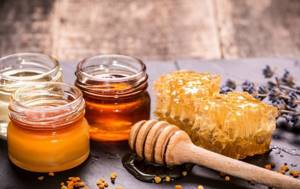
Honey has a lot of beneficial substances
The antimicrobial, antimycotic and antibacterial properties of honey have been clinically confirmed, so recipes based on it are widely used in alternative medicine for the treatment of cough, bronchitis, whooping cough and other diseases of the bronchopulmonary system. Honey is useful for inflammation of the kidneys and bladder, and it can be used topically to treat wounds and burns. In limited quantities, natural honey is allowed for diabetes, but the amount should not exceed ½ teaspoon per day (it is best to drink it with herbal tea).
pros
- strengthens the immune system;
- destroys bacteria and fungus, relieves inflammation;
- heals wounds and burns;
- helps with inflammatory diseases of the kidneys and bladder;
- thins mucus and stops coughing;
- enriches the body with useful and nutritious substances.
Minuses
- low-quality honey can provoke an allergic reaction.
Despite the fact that honey is very useful for both children and adults, you should not consume it regularly in large quantities, especially if you have carbohydrate metabolism disorders and varying degrees of obesity.
honey
Video - How to choose honey
Feijoa
Feijoa is an exotic fruit native to sunny Brazil. Its fruits are rich in sugars, organic substances, vitamins and iodine. By the way, in terms of iodine content, this fruit is almost 3 times higher than river fish, so feijoa pulp and puree are recommended to be included in the diet of people living in northern areas with low iodine content in local food products. Feijoa also contains a lot of ascorbic acid, iron, potassium, phosphorus and other important substances that help strengthen the immune system and increase the body's resistance to infectious agents and various negative environmental factors.
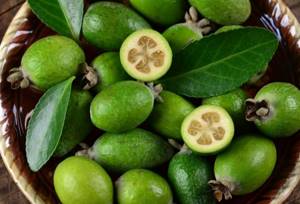
Feijoa contains a lot of ascorbic acid, iron, potassium, phosphorus and other important substances
pros
- strengthens the immune system;
- improves the condition of hair and skin;
- enriches the body with vitamins, macro- and microelements (primarily ascorbic acid, iron and iodine);
- improves appetite, helps fight exhaustion;
- prevents the development of anemia;
- increases performance;
- eliminates the manifestations of chronic fatigue syndrome.
Minuses
- a contraindication can only be individual intolerance or an allergic reaction to this type of fruit.
One spoon of feijoa per day satisfies the body’s need for vitamins, iodine, iron, amino acids and organic substances by almost 30%, so its fruits are definitely one of the healthiest foods.
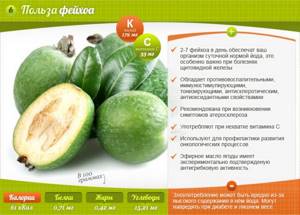
Composition and benefits of feijoa
feijoa
Proper nutrition is the key not only to beauty, but also to health and longevity. Regular inclusion of healthy foods in your diet can significantly reduce the risk of developing many serious diseases (by compensating for the deficiency of certain vitamins and minerals) and improve your health. Of course, these foods may not have a significant impact on the immune system if a person smokes, drinks heavily, or is regularly exposed to toxic factors, but they are an excellent addition to exercise, walking, and other elements of a healthy lifestyle.
